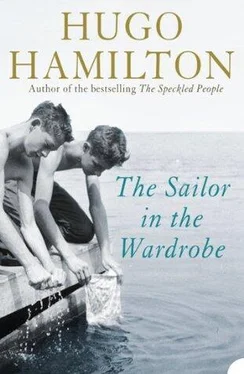After a while, my father comes up and bangs the door with his fist, but it’s no use and my mother is finally able to persuade him to go back down. She closes the door of the front room and they discuss the whole thing rationally once more. From the banisters, I can hear my sisters whispering in the kitchen, trying to keep Ciarán happy. In the front room my father’s voice was going up and down and I’m wondering what’s going to happen to John Lennon now? I can hear my father saying that John Lennon is the last nail in the coffin for the Irish language. My mother says it’s only music and that she listened to some pretty stupid pop songs as well in Germany until they were banned. Onkel Ted tells him it’s important not to be negative, there’s no principle involved and music is not like a hurling match with winners and losers. My mother says it’s time to do something big, something generous and imaginative.
They’re talking for a long time and it even looks like they’ve forgotten about it, thinking back over their lives instead and how things have not worked out the way they had imagined it. Maybe they’re thinking about the time further back when my father was younger and refused to take advice from anyone because he was afraid it would weaken his ideas. When we were small I can remember him going to the funeral of his cousin Gerald in Skibbereen. My mother often made us pray for Onkel Gerald who was drinking too much and telling too many stories. We were not told how he died, only that it was a tragedy. Some time later we found out that he had taken his own life because his older brother had died in front of his eyes in a drowning accident and he never came to terms with that. My father wanted me to know that as a warning, so I would be afraid of alcohol, because Onkel Gerald could have been a great writer if he hadn’t squandered all his stories in pubs around West Cork.
It was one of the biggest funerals ever in Skibbereen, and afterwards all the relatives and friends gathered in the house for sandwiches and tea and whiskey. Everybody was smoking and talking and the small house was crowded, right out to the front door. People kept breaking into tears all the time because Onkel Gerald was a good man who was loved by everybody all the way up to Cork City and Mallow, as far back as Gougane Barra and Bantry. Nobody wanted to believe that he committed suicide in his own home town, when there was so much to live for and he could have been one of the best journalists in Ireland and there was a job open for him any time with the Southern Star .
There was an argument at that funeral. When all the people were gathered together, Aunty Eily came over to my father and spoke to him about how he was raising his children. Even though she was heartbroken with grief for her son Gerald, she told my father that what he was doing was wrong. The news was out that my father had stopped allowing his own children to speak English. Even though she had never been to our house and never travelled out of Skibbereen, she had heard it from other relatives who came to visit us from West Cork, saying they had met my mother and tasted her cakes. They said the children were very polite, but that we were afraid. ‘Fearful’ was the word they used, because each time they asked us a question, we took in a deep breath and were afraid to answer. After the funeral, Aunty Eily told my father that he should stop what he had started before it was too late.
‘You’ll turn them against you,’ she said.
He didn’t listen to her. He smiled and said everybody in Ireland would soon be doing the same. He was leading by example and our family was a model for all Irish families in the future. He would not allow anyone to interfere with his mission or say anything about the way that he wanted to run his family.
I can hear Onkel Ted leaving the house and I know they must have come to a decision. My father has been persuaded to do things calmly and they come up the stairs to my room. I see my father holding John Lennon in his hand and handing it back to me like a toy that has been confiscated. He sits down beside me on the bed with my mother on the other side, holding my hand.
‘If you want to listen to it,’ my father says. ‘If you want to listen to any record, just ask me and I’ll put it on for you.’
He does not mention the fact that I broke into his music cabinet like a thief. He’s going to forget about that. He smiles, trying to put the rage behind him.
‘I mean it,’ he says, and I know this is a big gesture from him. ‘Any time.’
Then he starts confessing something to me. He tells me about the wedding he went to in Skibbereen some weeks back. My father and Onkel Ted both went together in the car, to the wedding of Eleanor and John. He tells me that Aunty Eily was there, too, even though she’s very old now. He could see by her face and the way she walked slowly, how much time had gone by, as if the future suddenly comes rushing towards them. At the reception afterwards, everybody was telling stories and singing, but this time it was my father who had tears in his eyes because he sat beside Aunty Eily and told her that he should have listened to her long ago while he had the chance.
‘I’m afraid you were right,’ he said to her. ‘I have turned them against me.’
My father is telling me this himself. He’s admitting to me that he was wrong. I want to run out of the room, because I can’t bear to think of him like a small boy, with Aunty Eily putting her arms around him. He has tears in his eyes, saying that she told him it is never too late. He says he hopes there is still some time left for us to be friends. He’s worried that one of these days I will leave the house and never come back.
I want to be generous to him. I want to tell him that there is no need to feel so betrayed, that the Irish people are still as Irish as they ever were, even if they’re all speaking English now. It only means they’ve become good at acting. They’re good at stepping in and out of new roles and new languages, because sometime along the way in the history of Ireland, they became good at being somebody else. I want to tell him that people like John Lennon and Ernest Hemingway and Franz Kafka are all living in the same country now. It’s the country I belong to as well, one without any flag. I want to tell him there is nothing to worry about and that music is not like war, but I don’t know how to explain that and I don’t know if it makes any sense. I don’t even know if I believe it myself.
One day, when I was out in the boat with Dan Turley, something happened that made me think nothing made sense any more. We were coming back by the island when I suddenly heard the shout again. Standing on the island was a man holding a bottle in one hand and waving his fist.
‘BASTARD’ I heard him shout.
It must have been the same man who had shouted Dan’s name from the top of the cliff. I could see there was something about him that caused Dan to go even more silent than before. The man on the island was reducing his name to a joke, an insignificant fisherman. Dan wanted him to go away, to drown and disappear. I could see him narrowing his eyes, imagining the man on the island already washed up on the rocks like a dead seal with bite marks punctured in his skin and big black holes where his eyes once were.
Sometimes voices carry really well across the water, depending on how the wind is set and how the waves are facing. When it’s calm and there’s no wind, the sound carries so far that you can think the whole bay is like a room and you can hear people miles away, just whispering. But this time, the man’s voice was not being carried very well and we could hardly hear him. He seemed to have no voice, even though his fist was up in the air and I could see him raging across the water at us. Here and there, the wind carried a word or two across and then whipped it away again.
Читать дальше
Конец ознакомительного отрывка
Купить книгу












